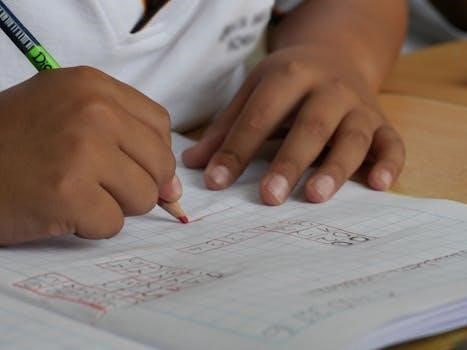
math olympiad elementary pdf
Math Olympiad Elementary PDF⁚ A Comprehensive Guide
Unlocking mathematical potential in elementary students often begins with engaging resources. This comprehensive guide explores the world of Math Olympiad Elementary PDFs, offering a pathway to problem-solving skills, preparation materials, and access to valuable sample problems and solutions.
Math Olympiads for elementary students are more than just competitions; they are enriching experiences designed to foster a love for mathematics and problem-solving. These olympiads, like MOEMS (Mathematical Olympiads for Elementary and Middle Schools), provide a platform for young learners, typically in grades 3-6, to showcase their mathematical abilities and develop critical thinking skills.
The problems presented in these olympiads often go beyond standard curriculum, encouraging students to think creatively and apply mathematical concepts in novel ways. Participation not only enhances their mathematical knowledge but also builds confidence and resilience in tackling challenging problems. These competitions serve as an excellent introduction to the world of competitive mathematics, preparing students for future academic endeavors.
Furthermore, involvement in math olympiads can positively impact both students and teachers, creating a more competitive and academically stimulating environment. Resources like practice questions, sample papers, and free video tutorials are readily available to support students in their preparation, ensuring they are well-equipped to excel in these stimulating challenges.
Benefits of Participating in Math Olympiads
Participating in Math Olympiads offers numerous benefits for elementary students, extending far beyond just improving math skills. These competitions foster critical thinking and problem-solving abilities, encouraging students to approach challenges creatively and strategically. They learn to analyze complex problems, break them down into smaller, manageable parts, and develop innovative solutions.
Math Olympiads enhance a student’s overall mathematical foundation, preparing them for more advanced concepts in the future. The exposure to non-routine problems and the need to think outside the box builds resilience and adaptability, valuable traits that extend to other areas of life. Furthermore, these competitions cultivate a love for mathematics by making it engaging and enjoyable, rather than a chore.
The competitive environment of Math Olympiads also teaches students important life skills such as time management and the ability to perform under pressure. Successfully navigating these challenges boosts their confidence and self-esteem, fostering a positive attitude toward learning. Moreover, participation can create a sense of community among mathematically inclined students, promoting teamwork and collaboration.
Key Topics Covered in Elementary Math Olympiads

Elementary Math Olympiads typically cover a range of topics designed to challenge young minds and foster a deeper understanding of mathematical concepts. Number theory forms a significant part, including divisibility rules, prime numbers, factors, and multiples. Students are often presented with problems that require them to apply these principles in creative ways.
Geometry is another key area, focusing on shapes, spatial reasoning, and measurement. Problems may involve calculating areas, perimeters, and volumes, as well as understanding geometric properties and relationships. Logical reasoning and problem-solving strategies are also heavily emphasized. Students are expected to use deductive reasoning, pattern recognition, and other logical skills to solve puzzles and mathematical challenges.
Algebraic thinking, even at the elementary level, is introduced through problems involving variables, expressions, and simple equations. This helps students develop a foundation for more advanced algebraic concepts later on. Combinatorics, the art of counting, also makes an appearance, challenging students to determine the number of ways to arrange or select objects. These topics collectively encourage critical thinking.
Sample Problems and Solutions (PDF Examples)
Delving into sample problems is crucial for Math Olympiad preparation. PDF examples offer a wealth of practice material and illustrate the types of questions encountered in these competitions. A typical problem might involve finding the missing digit in a number sequence, requiring a keen eye for patterns and relationships. Another example could be a geometric puzzle where students must determine the area of a complex shape by breaking it down into simpler components.
These PDFs not only provide the problems themselves but also detailed solutions, offering invaluable insights into problem-solving strategies. The solutions often demonstrate multiple approaches, allowing students to understand the problem from different angles and choose the method that best suits their thinking style. By studying these solved examples, students can learn how to identify key information, apply relevant concepts, and present their solutions in a clear and logical manner.
Furthermore, exposure to various problem types helps build confidence and reduces anxiety during the actual competition. The PDF format makes these resources easily accessible and printable, allowing students to practice anytime, anywhere. Regular practice with sample problems is essential for success.
Resources for Practice and Preparation (Free PDFs)
A plethora of resources exist to aid in Math Olympiad preparation, and many are available as free PDFs. These resources often include past contest papers, practice worksheets, and comprehensive guides covering key mathematical concepts. Websites dedicated to mathematics education frequently host these materials, offering a valuable service to aspiring Olympiad participants.
Free PDFs can be an excellent starting point for students new to Math Olympiads. These resources provide an overview of the types of problems encountered, the level of difficulty, and the specific mathematical skills required. Practice worksheets often focus on particular topics, such as number theory, algebra, geometry, and combinatorics, allowing students to strengthen their understanding in these areas.
Furthermore, some organizations offer free sample contests in PDF format, giving students a realistic experience of the actual competition. These sample contests can be used to assess a student’s current level of preparation and identify areas where further study is needed. Many resources include not only problems but also detailed solutions, helping students to understand the reasoning behind each step and learn effective problem-solving techniques. Accessing and utilizing these free PDF resources is crucial for effective and affordable Math Olympiad preparation.
MOEMS (Mathematical Olympiads for Elementary and Middle Schools) Overview
Mathematical Olympiads for Elementary and Middle Schools (MOEMS) is a prominent international mathematics competition designed for students in grades 4 through 8. The organization, a non-profit, aims to cultivate enthusiasm for mathematics and enhance problem-solving skills in young students. MOEMS contests are held annually, typically from November to March, with monthly tests administered at participating schools.
Each test consists of five challenging problems that require creative thinking and mathematical reasoning. Students are given 30 minutes to complete the test, emphasizing both accuracy and speed. The problems cover a range of mathematical topics, including arithmetic, algebra, geometry, and combinatorics, tailored to the elementary and middle school curriculum.
Participation in MOEMS provides numerous benefits for students. It encourages them to think critically, develop problem-solving strategies, and gain confidence in their mathematical abilities. MOEMS also fosters a competitive academic environment, motivating students to excel in mathematics and prepare them for future challenges in higher education and careers. The program’s emphasis on problem-solving aligns with broader educational goals, promoting analytical thinking and logical reasoning skills that are valuable in all areas of life.
Strategies for Solving Math Olympiad Problems
Tackling Math Olympiad problems requires a blend of mathematical knowledge and strategic problem-solving techniques. One effective strategy is to thoroughly understand the problem before attempting a solution. Read the problem carefully, identify key information, and determine what is being asked. Drawing diagrams or creating visual representations can often help to clarify the problem and reveal potential pathways to the answer.
Another valuable strategy is to break down complex problems into smaller, more manageable parts. By dividing the problem into simpler steps, students can focus on each component individually and avoid feeling overwhelmed. Working backwards from the desired result can also be a useful approach, especially for problems involving sequences or patterns.
Pattern recognition is crucial in many Math Olympiad problems. Look for recurring patterns or relationships within the problem that might lead to a solution. Estimation and approximation can also be helpful, particularly for multiple-choice questions where eliminating unlikely answers can increase the chances of selecting the correct one.
Finally, practice is essential. Regularly solving a variety of problems helps to develop familiarity with different types of questions and refine problem-solving skills. Reviewing past problems and solutions can also provide valuable insights and strategies for tackling future challenges.
Time Management Tips During the Competition

Effective time management is crucial for success in Math Olympiad competitions. A well-planned strategy can help students maximize their potential and avoid rushing through problems. Before the competition, familiarize yourself with the format and the number of questions. Allocate a specific amount of time for each problem, taking into account the difficulty level.
During the competition, stick to your allocated time for each problem. If you’re struggling with a particular question, don’t spend too long on it. Mark it and move on to the next one. You can always return to it later if you have time. It’s better to attempt all the problems and secure points for the ones you can solve easily than to get bogged down on a single difficult question.
Prioritize problems based on your strengths. Start with the questions you feel most confident about to build momentum and confidence. Keep an eye on the clock and adjust your pace accordingly. If you find yourself running out of time, focus on the remaining problems that offer the most potential points.

Avoid getting distracted or spending too much time checking your answers during the competition. If you finish early, use the remaining time to review your work and look for any obvious errors. However, avoid second-guessing yourself unless you have a strong reason to believe your initial answer was incorrect.
Common Mistakes to Avoid in Elementary Math Olympiads
Participating in Math Olympiads is a great way for elementary students to challenge themselves and improve their problem-solving skills. However, to succeed, it’s essential to avoid common mistakes that can hinder performance. One frequent error is misreading the problem. Students should carefully read each question to fully understand what is being asked. Rushing through the problem statement can lead to incorrect interpretations and ultimately, wrong answers.
Another common mistake is making careless calculation errors. Even if a student understands the concepts and sets up the problem correctly, a simple arithmetic mistake can result in a loss of points. Taking the time to double-check calculations can prevent these errors. Furthermore, students often fail to show their work. Showing each step in the solution process is important for two reasons. First, it allows the student to review their own reasoning and identify any mistakes they may have made.
Lastly, some students don’t manage their time effectively. Getting stuck on a difficult problem can lead to running out of time to complete the rest of the test. It’s important to allocate time wisely and move on to other problems if one is proving too challenging.
How to Find and Download Relevant PDFs
Finding high-quality Math Olympiad Elementary PDFs can significantly aid in preparation and practice. Start by exploring official Math Olympiad websites such as the Mathematical Olympiads for Elementary and Middle Schools (MOEMS) for resources, including sample problems and past papers, often available in PDF format. Educational websites and online forums dedicated to mathematics education frequently host collections of problems and solutions shared by educators and students;
Using specific search terms on search engines like Google, such as “Math Olympiad Elementary PDF,” “MOEMS sample problems,” or “elementary math competition questions,” can yield relevant results. Be sure to refine your search by specifying the grade level or topic you’re interested in. Once you’ve located a promising PDF, ensure it comes from a reputable source to guarantee accuracy and relevance.
Many websites offer direct PDF downloads, while others may require registration or a subscription. Always check the terms of use and copyright information before downloading and using any materials. Additionally, explore online libraries and repositories that specialize in educational resources, as they often provide a wealth of Math Olympiad materials in PDF format for easy access and download.
Parents and educators play a vital role in nurturing this mathematical excellence. By providing access to resources, offering guidance, and celebrating achievements, they can instill confidence and resilience in students. The availability of Math Olympiad Elementary PDFs, including practice problems, solutions, and study materials, democratizes access to quality education, enabling students from diverse backgrounds to participate and excel.

Ultimately, the goal is not just to win competitions but to ignite a passion for mathematics that lasts a lifetime. Encouraging students to embrace challenges, persevere through difficulties, and collaborate with peers fosters a culture of mathematical excellence. The Math Olympiad journey, supported by comprehensive PDF resources, empowers students to become confident problem-solvers and innovative thinkers, shaping them into future leaders in various fields.


Leave a Reply
You must be logged in to post a comment.